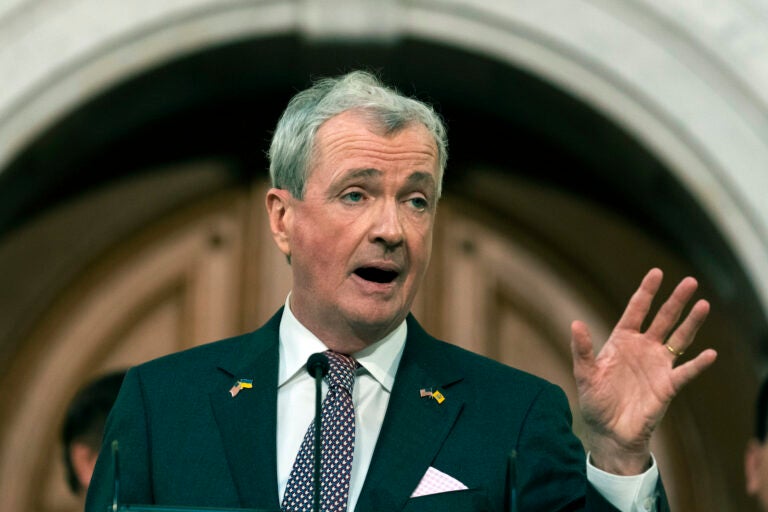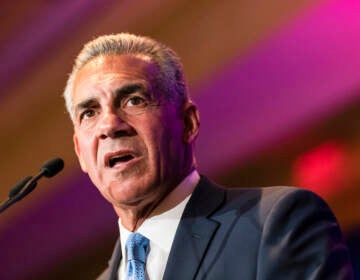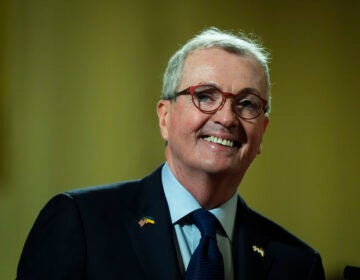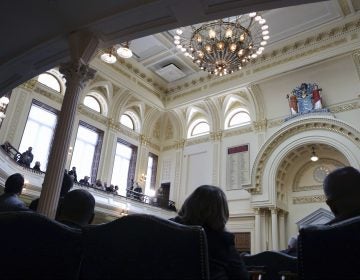N.J. governor outlines budget with billions in property tax breaks and proposes partial reinstatement of corporate business tax
While announcing the largest budget in the state's history, Gov. Murphy proposed reviving a tax on Jersey’s most profitable corporations.
Listen 1:02
New Jersey Gov. Phil Murphy delivers his State of the State address to a joint session of the Legislature at the statehouse, in Trenton, N.J., Tuesday, Jan. 10, 2023. (AP Photo/Matt Rourke, File)
From Camden and Cherry Hill to Trenton and the Jersey Shore, what about life in New Jersey do you want WHYY News to cover? Let us know.
Gov. Phil Murphy’s proposed $56 billion dollar budget for 2025 is the largest in the state’s history and is 5% bigger than last year’s financial plan.
The proposal presented Tuesday includes more than $2 billion in funding for another round of ANCHOR property tax relief for homeowners and renters. It also seeks funding to offer tax rebates to seniors and disabled residents and provides $200 million for the Stay NJ property tax reduction program for seniors slated to begin in 2026.
During his speech, Murphy proposed reinstating the state’s corporate business tax (CBT) for Jersey’s most profitable corporations. He called it a “corporate transit fee.”
“With this fee we’re going to ask the biggest corporations with net incomes greater than $10 million to support NJ Transit’s future,” he said.
The mass transit agency, which received billions of dollars in federal assistance through the Coronavirus Aid Relief and Economic Security (CARES) Act, is facing a looming budget shortfall of close to $1 billion.
The governor did not specify how much the corporate transit fee would be, but administration sources indicate it will be 2.5% higher than the current tax they’re paying, and that it will generate around $800 million annually.
The call to bring back the CBT for the state’s most profitable businesses comes about two months after the tax was allowed to sunset.
The proposed corporate transfer fee did not impress Republican leaders. Assembly Budget Officer Nancy Muñoz described it as “rebranding” the corporate tax surcharge that expired at the end of 2023.
“We applauded ourselves for eliminating the corporate business tax,” she said. “Now, we’ve reinstated the corporate business tax, and what is driving the businesses out of New Jersey is this corporate business tax.”
Muñoz added that there is enough money in the budget to fund NJ Transit, suggesting that the $1.5 billion in legislative add-ons to the current budget could’ve gone toward the transit agency.
Murphy’s spending plan also includes expanded funding for health care for children, investments in pre-k and public schools, a school lunch program and more money for a nursing expansion initiative. Also included in the budget is money for a program to help aspiring teachers, build offshore wind farms, expand the state’s electric grid infrastructure and promote innovation in artificial intelligence.
“We have crafted this year’s budget, letter by letter, line by line to support the working families who have led New Jersey through hard times,” Murphy said, “Our promise has always been putting the needs of our families ahead of special interests.”
The governor also proposed creating a new program called RetireReady NJ, which will provide nearly all workers, particularly those who do not have a pension or 401(k), an option to invest in a retirement savings plan.
Among other proposed spending is a full payment to the state’s pension system and expanded health insurance options, medical debt relief assistance and more money for affordable housing.
“Together we’re going to continue building that stronger and fairer New Jersey where every family, especially those who worry that they’ve been forgotten, has a fair shot at a brighter future,” he said.
Republican leaders in the Legislature describe Murphy’s proposal as “more of the same,” and that the budget is continuing to spend more money than what the state is taking in.
“We think that when you look behind the curtain you’re going to see something that’s a lot different than was projected,” Senate Minority Leader Anthony Bucco said. “While the governor likes to talk about the state being stronger and fairer, when you look deep inside this budget, I don’t think that’s what you’ll find.”
Republican leaders claim that there are hidden tax increases within the budget and that about 140 school districts are facing cuts in state aid.
“How do you go back to Toms River, how do you go back to Randolph, how do you go back to Jefferson Township, that are losing millions and millions of dollars in school funding, and say to them, ‘Well, look, it’s stronger and fair’?” Bucco said. “The kids in those school systems and the parents of those school systems, they don’t think it’s stronger and fair.”
Bucco and his colleagues are calling for a bipartisan and “transparent” budgeting process where they are allowed to provide input.
“Give us an opportunity to look at these numbers to begin to create changes in the way the state’s been operating,” Bucco added. “The state should be operating as most people operate …your recurring expenses should be covered by your recurring revenues.”
For the next four months, Murphy’s spending plan will be discussed and debated by members of the Legislature.
A final state budget must be adopted before July 1.
WHYY is your source for fact-based, in-depth journalism and information. As a nonprofit organization, we rely on financial support from readers like you. Please give today.








